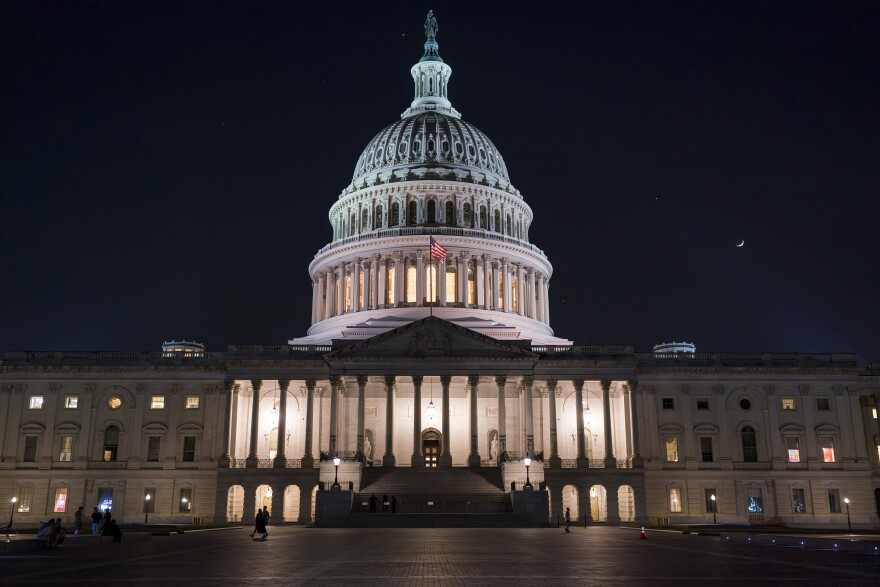The Mills administration says it’s preparing for the possibility that the U.S. government will default on its debt, an outcome that it says will have “serious implications” for the state economy and Maine residents.
The impasse over the debt ceiling has been a slow-motion drama since Republicans took narrow control over the U.S. House of Representatives in January. Now, as the White House and House Republicans struggle to negotiate a deal on spending cuts, the prospect of an unprecedented default on June 1 is forcing states to game out exactly how the federal government’s failure to pay its bills will affect them.
In Maine, like elsewhere, a default could delay benefit payments like Social Security and paychecks for the roughly 10,000 federal employees in the state. State officials also warn that it will jack up unemployment and force the state to tap its budget reserves to fill the funding gap to administer programs that receive federal funding like Medicaid, a health insurance program for low-income residents.

“The United States defaulting on its debt would have catastrophic consequences for our state, for our economy, and for our people,” Democratic Gov. Janet Mills said in a statement. “My Administration will continue to prepare for the possibility of a default to the greatest extent possible, but, fundamentally, Washington must act in a responsible way, put an end to the repeated cycle of manufactured crises, raise the debt ceiling, and lift the cloud of self-induced anxiety and fear generated through this needless political brinksmanship.”
Officials from Mills’ budget office have prepared an analysis of scenarios, although they acknowledge that some of them are speculative because the U.S. has never defaulted on its debt before.
Some possibilities include the disruption of air travel, border crossings and potentially the turning away of patients who use Medicare and Medicaid for health care.
“Total personal income growth for the state could slow or even decline,” Sharon Huntley, a spokesperson for the Department of Administrative and Financial Services, said in a statement. “Additionally, if the Federal government defaults, Social Security recipients, Federal employees, and others who are due Federal benefits and payments would not receive them. This would have an outsized impact on Maine people, given that Maine is the oldest state in the nation.”
Huntley added that Maine’s strong budget reserves would likely help it blunt the short-term impacts of a default, but the problem will worsen if House Republicans and President Joe Biden take a long time to resolve the impasse. Huntley said the state has a $4.4 billion portfolio of federal programs and $1.5 billion in available cash.
“With those accessible liquid assets, Maine would be able to evaluate options to cover paused federal funding for roughly two months — but we would also need assurances of Federal repayment for that money,” Huntley said.
A default would also affect Maine’s two-year budget because it’s funded in part by prospective tax collections and consumer spending predictions that may not come to fruition if personal income falls.
The state has already enacted a $9.9 billion budget and lawmakers are considering adding to it before the end of the legislative session.
Legislative update
The Legislature continues to slog through its work, with a lot of big-ticket proposals still awaiting action by the House and Senate.
The governor’s bill allowing abortions later in a pregnancy is among them. The proposal has yet to emerge from the Judiciary Committee, although that might happen soon as all legislative committees prepare to finish their work.
Anti-abortion activists, who are contemplating a people’s veto if they can’t defeat the bill in the Legislature, held a rally Thursday in anticipation of the committee’s vote.
The rally coincided with the public hearing on a paid family leave proposal that is being pushed by Democrats and progressive advocacy groups. Business groups oppose it. Both sides say they’re willing to compromise, but it’s unclear whether that will happen. The rhetorical battle over the proposal is in full swing. On the day of the hearing the Maine State Chamber of Commerce and the Retail Association of Maine wrote a joint column in the Portland Press Herald describing the proposed bill as “unworkable” and “a new, short-term disability insurance program that will cost hundreds of millions of dollars and be one of the most benefit-rich programs in the country.”
Supporters of the bill appear to have leverage to get the bill passed. If the Legislature doesn’t enact their proposal, a ballot initiative will be launched next year. As Maine Public previously reported, the ballot initiative is bolstered by some serious funding from progressive mega donors.
Meanwhile, proposals dealing with subsidies for solar energy development and internet privacy continue to hang fire. The internet privacy bills, which include a proposal to repeal Maine’s 2019 landmark privacy protection law, could be carried over until next year’s session.
An anticipated tribal sovereignty bill will also wait until next year.
About Mal
It’s likely that many readers have by now heard the heartbreaking news about the passing of former Maine Public State House bureau chief Mal Leary. He was 72. He spent 45 years of his life covering the news and Maine politics.
His coverage, his knowledge and the length of his journalism career are likely how many people will remember him. I’ll remember all of that and a few other things.
Mal loved cats. His affinity for them always made sense to me. Mal was a fastidious person and reserved in the sharing of his personal life. He could also be incredibly warm and sentimental if you could win his trust.
Mal had high expectations for people, but often higher ones for himself. Reporters who heard the stream of expletives from his office when he messed up recording his voice tracks can confirm this. It was a jarring experience for first-time visitors to the State House press corps.
“Is that coming from Maine Public Radio?” they’d sometimes ask.
Yes. Yes it was.
Mal was always entertained by legislators’ attempts at humor during debates.
“Ha!” he would bellow. I never understood this, but I loved how he seemed genuinely amused.
I also loved his answer when someone asked how he was doing.
“Functioning,” he’d say.
And that was that.
Mal loved junk food. Two breakfast sandwiches from McDonald’s washed down with a soft drink, typically a diet Cherry Pepsi. (There’s still two cans in our mini fridge here at the bureau.)
Mal’s sweet tooth was always a source of interest for my son, as were stories about Mal and his legendary crankiness.
“What did Mal bring for snacks today?” he’d ask.
Nutterbutters and Milano cookies were a staple.
“Any good Mal stories?”
Almost always. Here’s one: A few years ago a young legislative aide once tried to limit the number of questions reporters could ask during a press conference.
“One more question,” the aide instructed.
“We’ll ask as many questions as we want,” Mal shot back. “This is a PRESS conference. It will be over when we’re done.”
And so it was.
Like a lot of people, I think my son had stitched together similar stories to assemble Mal as a character. But as we listened to Maine Public’s Irwin Gratz narrate Mal’s obituary on our way to school Monday, I think he realized Mal was much more than that. He laughed when Irwin played Mal’s gravitas-laden signoff (“I’m MAL Leary.”), but grew silent as Irwin read the compendium of career highlights pulled together by Susan Sharon and Keith Shortall.
Actually, we were both silent. I was relieved that I was wearing sunglasses.
Of course, Mal’s career had long ago defined him for a lot of people. I think he understood this. Maybe that’s why he worked longer and harder than he needed to. Shortly after he retired in 2021, he wrote me an uncharacteristically cheery email. He was thrilled to learn that State House reporter Kevin Miller was replacing him.
He signed off with this, “I miss you guys, but not the job. You don’t realize how it dominates your life until you stop doing it."
Programming note
We’re making some changes to the Pulse that will affect when you receive this newsletter and also the publication of the companion podcast.
For nearly five years, the Pulse newsletter has been sent out at 10 a.m. Fridays, while the podcast posts later in the afternoon. That publication schedule will change next week, but it’s by no means the end of the Pulse.
Going forward Pulse newsletters and podcasts will be delivered closer to when the news happens. That means the Pulse might be released at any point during the week. Publications might also focus on one or two topics and not just the roundup style we’ve leaned toward during recent years.
With these changes we hope to deliver the Pulse more judiciously — and potentially more frequently.
Finally, we just want to say thank you to our audience. Your loyalty has made the Pulse possible and it has been top of mind for us as we’ve contemplated making these changes.
Maine's Political Pulse was written this week by State House correspondent Kevin Miller and chief political correspondent Steve Mistler, and produced by digital news reporter Esta Pratt-Kielley. Read past editions or listen to the Political Pulse podcast at mainepublic.org/pulse.




